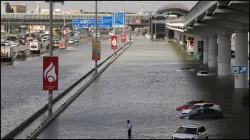Govt issues helpline numbers for Indians affected by extreme weather in Dubai, in touch with authorities
The Indian Consulate General in Dubai said it had facilitated contact between stranded passengers and their families in India and extended relief materials. The UAE recorded its highest rainfall in the last 75 years, flooding roads, buildings and the airport in Dubai.

Dubai: The Indian Consulate General in Dubai has issued helpline numbers for Indian citizens affected by the extreme weather events in Dubai and the northern part of the United Arab Emirates, after the country experienced unprecedented heavy rains and widespread floods. The Indian government is currently in touch with the UAE authorities and the airlines to facilitate stranded passengers.
In a series of tweets, the Indian Mission in Dubai posted helpline numbers and said it had facilitated contact between stranded passengers and their families in India. It also said that relief measures have been extended with the help of Indian community organisations and regular updates from the airlines are being conveyed to travellers.
"We are in touch with UAE authorities and the airlines to facilitate stranded passengers. Regular updates from airlines are being conveyed to travelers. Relief measures have been extended in association with Indian community organizations," it said.
Extreme weather in Dubai
The UAE experienced an unprecedented weather event in the last few days as heavy rains and a storm struck the nation, sweeping its main city Dubai and leading to widespread disruption of essential services like traffic or air travel. Even now, the country is struggling to recover from the rainfall as its main airport worked to restore normal operations even as floodwater still covered portions of major highways and roads.
The state-run WAM news agency called the rain Tuesday “a historic weather event” that surpassed "anything documented since the start of data collection in 1949". The Emirates carrier, whose operations had been struggling since the storm, had stopped travellers flying out of the UAE from checking into their flights as they tried to move out connecting passengers.
By the end of Tuesday, more than 142 millimetres (5.59 inches) of rainfall had soaked Dubai over 24 hours. An average year sees 94.7 millimetres (3.73 inches) of rain at Dubai International Airport. Other areas of the country saw even more precipitation. The UAE's drainage systems quickly became overwhelmed, flooding out neighbourhoods, business districts and even portions of the 12-lane Sheikh Zayed Road highway running through Dubai.
Emergency workers tried to clear waterclogged roads and people assessed the damage to homes and businesses on Thursday after the record-breaking storm. Flooding trapped residents in traffic, offices and homes. Many reported leaks at their homes, while footage circulated on social media showed malls overrun with water pouring from roofs. One person was reported dead in the UAE and 20 in neighbouring Oman.
Why the heavy rains in UAE?
Rainfall is rare in the UAE and elsewhere on the Arabian Peninsula, which is typically known for its dry desert climate. Summer air temperatures can soar above 50 degrees Celsius. Following Tuesday's events, questions were raised about whether cloud seeding, a process that the UAE frequently conducts, could have caused the heavy rains.
Since 1982, the UAE has been using cloud seeding technology, which is also known as artificial rain. This was taken to new heights by the UAE's Rain Enhancement Program (UAEREP), managed by the Emirates' National Centre of Meteorology (NCM). However, experts disagreed with this reasoning. Meteorologists and climate scientists said the extreme rainfall is akin to what the world expects with human-caused climate change, and one way to know for certain that it was not caused by tinkering with clouds is that it was forecast days in advance.
(with inputs from agencies)
ALSO READ | Dubai floods blamed on cloud seeding. But, experts opine different theory I DETAILS